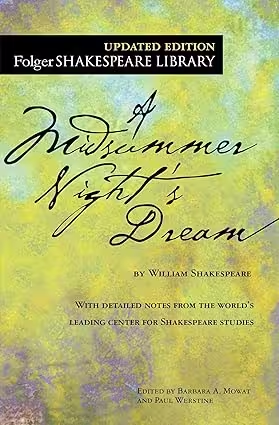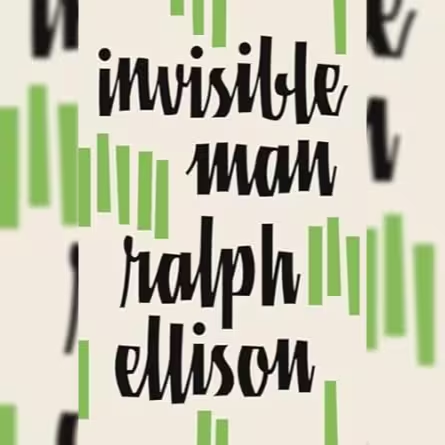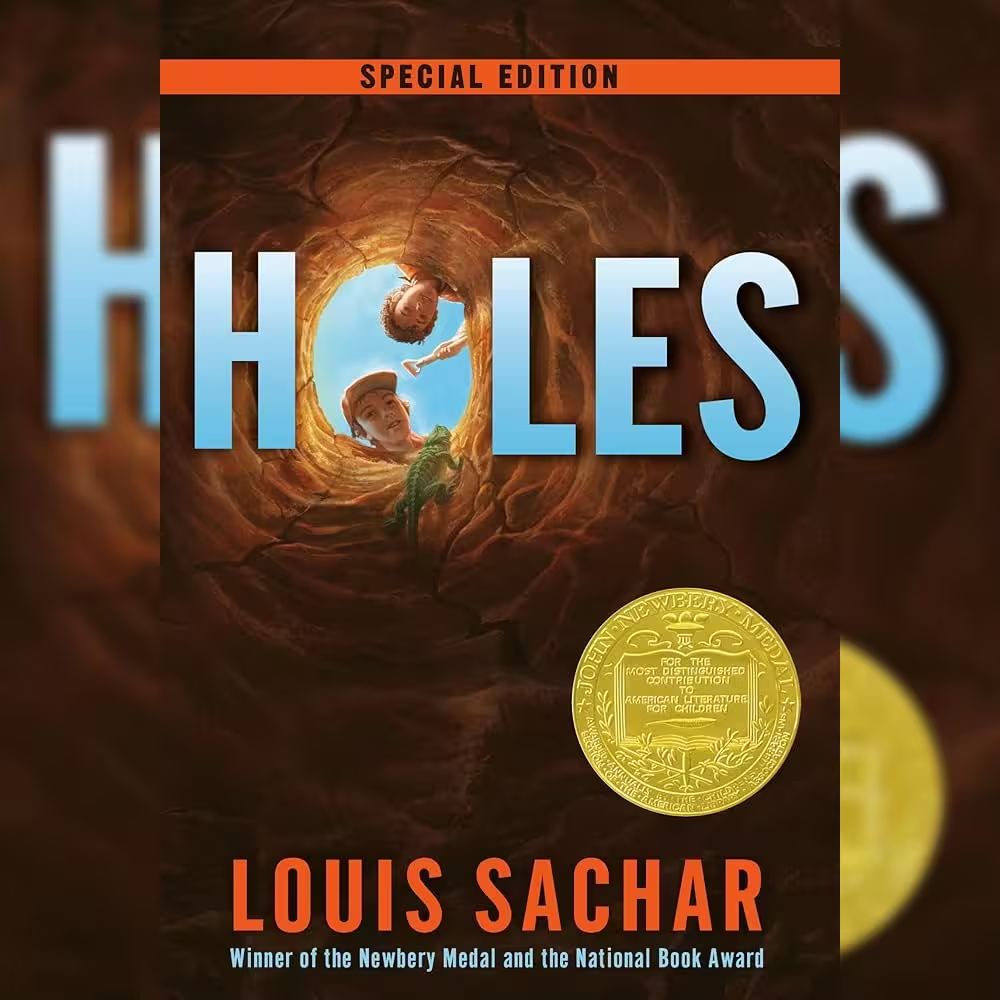This book review of A Midsummer Night’s Dream by William Shakespeare is part of my Shakespeare Quest.
This post pay contain affiliate links, which means that I may receive a commission if you make a purchase using these links. As an Amazon Associate I earn from qualifying purchases. Thanks for helping to support the content on this site.

A Midsummer Night’s Dream
- Author: William Shakespeare
- Genre: Theater / Plays
- Publisher: Simon & Schuster (Pictured version)
- Pages: 304 Pages, Paperback
Are you sure That we are awake? It seems to me That yet we sleep, we dream
Shakespeare, A Midsummer Night’s Dream
I think I may have seen A Midsummer Night’s Dream on stage at some point in high school or college, I’m not sure. Like much of Shakespeare’s works, it just never really stuck. I do know for sure, I had never actually read the original work. Until now! My initial thoughts were that A Midsummer Night’s Dream definitely has its magical moments. And it’s quite fun and playful. But, at the same time, it also left me with some mixed feelings in a few ways. It’s an absolutely fascinating play, even for those who, like me, are still getting their footing with Shakespeare’s style.
Plot Summary
A Midsummer Night’s Dream by William Shakespeare is a comedy about love, magic, and the chaos that (sadly? hilariously?) results when the two mix. The story focuses on four young lovers—Hermia, Lysander, Helena, and Demetrius. These four characters (in every sense of the word) find themselves in a tangled mess of feelings and jealousy that boarder on the absurd at times. Hermia and Lysander are in love, but her father insists she marries Demetrius. To escape, they run off into a nearby forest. Meanwhile, Helena, who’s desperately in love with Demetrius, follows them, hoping for a chance to win him over.
In the forest, things only get more chaotic. A band of fairies led by King Oberon and Queen Titania is also present, along with Oberon’s mischievous servant, Puck. Oberon decides to use a magic potion to make Titania fall in love with the first creature she sees—who turns out to be Bottom, a comical character with a donkey’s head. Ever the trouble-maker, Puck also uses the potion on the human lovers, causing even more confusion.
By the end, the love triangles (or squares?) untangle, and everyone pairs up as they should. But the journey there is full of misunderstandings, humor, and surprising insights into human nature. It’s a strange mix of fantasy and comedy, with plenty of twists that kept me engaged.
My Review
The Magic of the Forest Setting
The forest setting creates a magical feel that’s perfect for the story’s light tone. Probably not a hot take, but to me it felt almost like the Lost Woods in Zelda – where magical things happen and things get really twisted and confused pretty quickly. The characters leave behind the rules of Athens, and anything goes once they’re among the trees. It’s in the forest that love spells can be cast, strange transformations happen, and the line between fantasy and reality blurs. This setting really adds to the charm and mystery of the play.
I found it interesting that Shakespeare used this forest to explore love’s unpredictable, sometimes chaotic nature. In this setting, love is portrayed as whimsical and easily influenced, something that doesn’t always follow logic. Oberon’s words to Puck—“What fools these mortals be!”—capture how out of control human emotions can get. I liked this theme, even if the spells and tricks sometimes made things confusing.
Mischievous Fairies and the Power of Magic
The fairies are a big part of what makes A Midsummer Night’s Dream so memorable. They bring an element of magic and mischief that’s unique to this play. Oberon and Puck are constantly meddling with the humans, and Puck’s mischief leads to some of the play’s funniest scenes. I loved Puck’s character. He’s unpredictable, a bit chaotic, and you’re never quite sure what he’ll do next. His famous line, “Lord, what fools these mortals be!” made me chuckle—it’s like he’s in on a joke that the humans just don’t understand.
At the same time, the fairies’ actions sometimes felt a little too manipulative. While it was funny to watch the humans stumble around, I couldn’t help but wonder how they’d feel knowing their emotions were being toyed with. The magic adds a layer of humor, but it also brings a slight sense of discomfort, which I think is intentional. It makes us question how much control we really have over our own emotions.
Relatable Characters with a Twist
The play’s characters are surprisingly relatable, even with all the magic and old-fashioned language. Hermia and Helena, in particular, stand out as characters who are driven by love but also have their own fears and insecurities. Helena’s unrequited love for Demetrius and her jealousy of Hermia felt surprisingly modern. At one point, Helena accuses Hermia of trying to show off and says, “O me! You juggler! You canker-blossom!” While the language is different, the emotions feel real. Who hasn’t felt jealous or insecure in matters of love?
However, the play doesn’t spend too much time exploring the characters’ deeper motivations. They’re mostly there to serve the plot, which makes sense for a comedy. Still, as someone newer to reading Shakespeare, I found myself wanting a little more insight into their inner lives. But maybe that’s just me expecting something from a play that was meant to be light and funny.
Humor That (Mostly) Stands the Test of Time
I expected A Midsummer Night’s Dream to be funny. I didn’t expect it to be laugh out loud funny. But sure enough, I found myself literally LOL’ing multiple times. The performance of “Pyramus and Thisbe” was so excessively over the top it was hard not to laugh.
That said… some jokes didn’t work to me. Sometimes Shakespeare’s humor relies a lot on wordplay and cultural references from his time, so I found myself consulting notes on the play to “get” the joke, which inevitably, made the joke less funny. I suppose with good notes and a second read through the humor would come through better – but there was enough at the surface level that this didn’t feel like a huge detractor for me. It’s clear, ultimately, that seeing the play live again would help reinforce some of this – and probably make a second read-through of this even better.
Parting Thoughts
I really enjoyed A Midsummer Night’s Dream. It’s charming and magical. It brings humor, romance, and a bit of mystery – which is fun. It was unique, thanks in large part to the magical combination of the setting, characters, and fantasy elements. Still, I have a ways to go fully getting used to Shakespeare and his writing – but you have to start somewhere! I feel like was a good starting point, though – the story is familiar, and approachable, regardless of when it was written.
I gave A Midsummer Night’s Dream a solid 4 out of 5 stars. It’s not perfect, or more accurately, I’m definitely not a perfectly skilled reader of either theater or more specifically, Shakespeare. If you’re new to Shakespeare like me, or just want a playful and approachable entry into the world of Shakespeare, then I’d have to say this is a great choice. Just remember: it’s ok not to get it all at first, and it’s ok to take your time and struggle with it! I think if you stick with it, you’ll find it as rewarding as I did.
Other Books You Might Enjoy
About the Author
William Shakespeare was an English playwright, poet, and actor, born in 1564 in Stratford-upon-Avon. He is widely known as one of the greatest writers in the English language and is often called England’s national poet. Shakespeare wrote 39 plays, 154 sonnets, and two long narrative poems. Some of his most famous plays include Romeo and Juliet, Hamlet, Macbeth, and A Midsummer Night’s Dream. His work is celebrated for its rich language, complex characters, and exploration of themes like love, power, and jealousy. Although there were no formal awards in his time, his influence grew over the centuries, and his works are still performed and studied worldwide. Today, Shakespeare is honored as a literary legend, and his writings continue to inspire artists and writers around the globe.
Reading Details
Start date: October 31, 2024
Finish date: November 1, 2024


